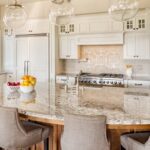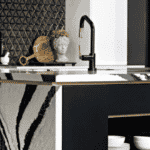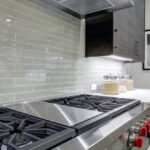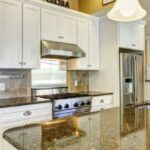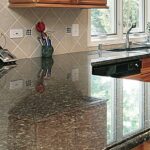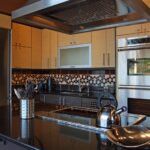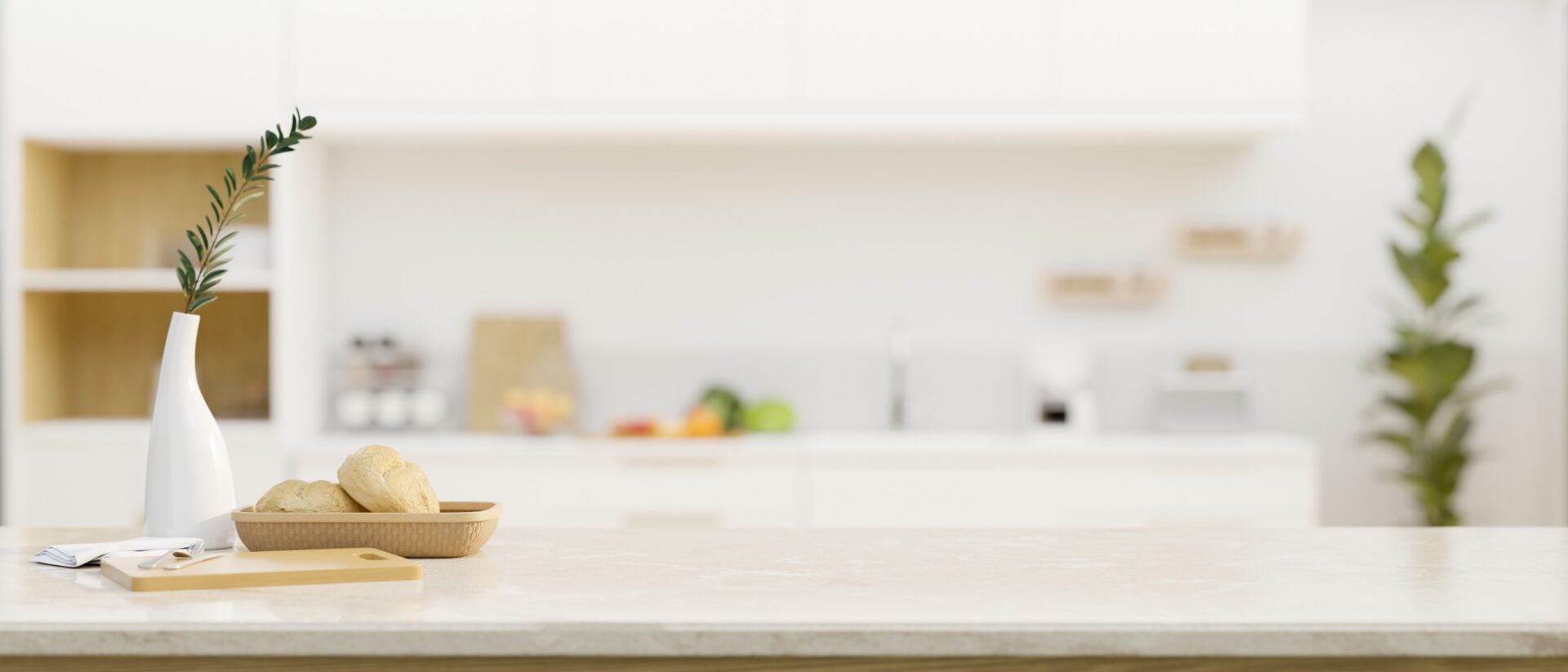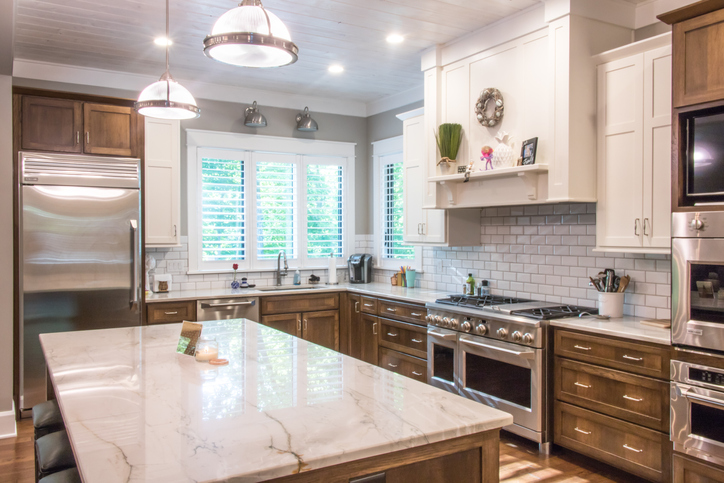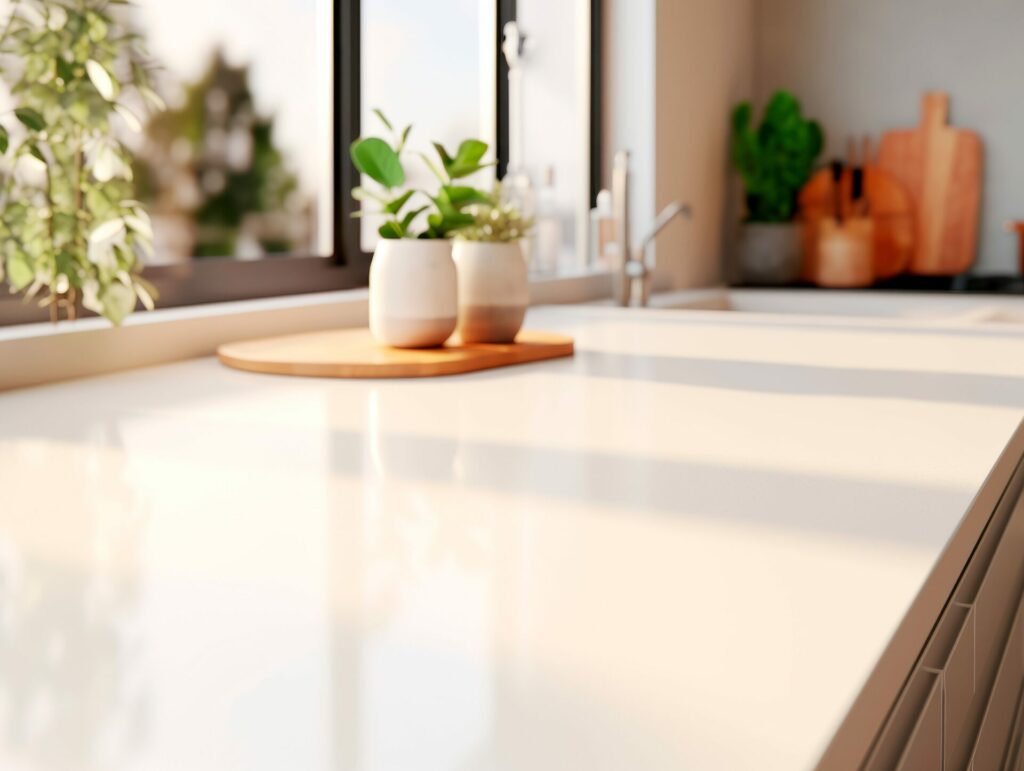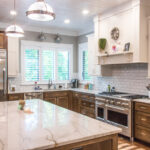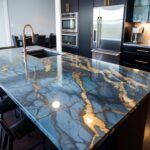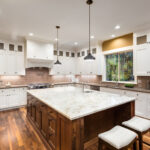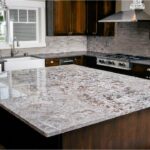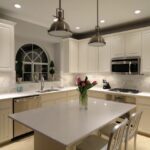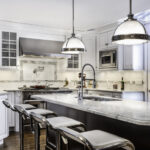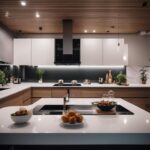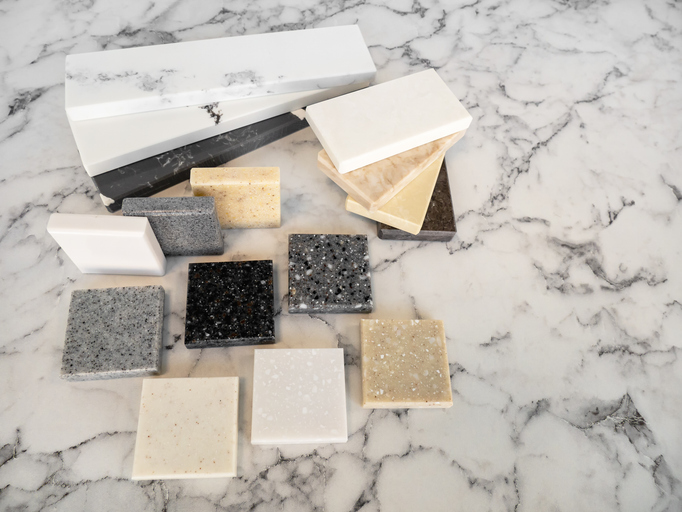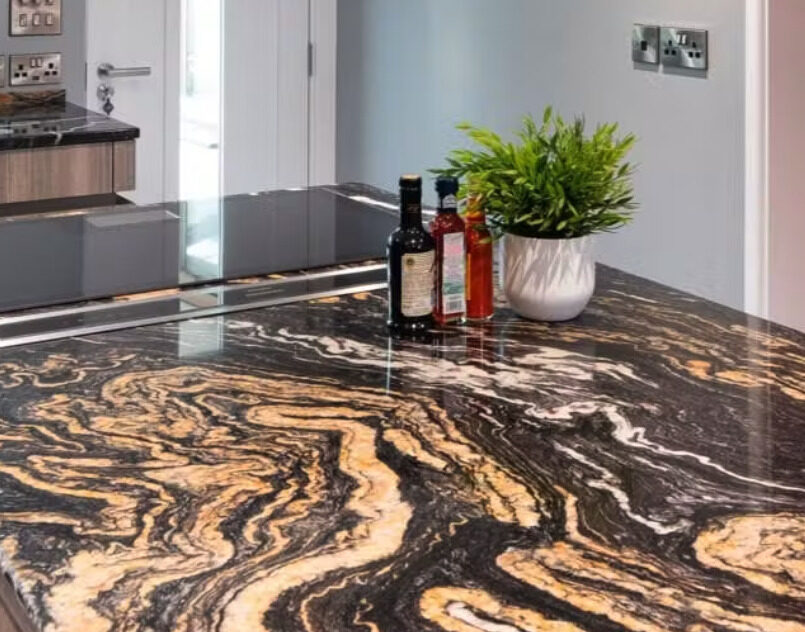Granite Vs. Corian Countertops: Which Countertop Material is More Durable
Introduction: Finding the Best Countertop for Your Kitchen
When it comes time to choose a new kitchen countertop, the options can seem overwhelming. You likely want a surface that is stylish, durable, and easy to maintain within your budget. Two premium countertop materials that balance these factors well are granite and Corian solid surface.
Granite countertops bring natural beauty and long-lasting resilience, while Corian countertops offer seamless repairs, design flexibility, and renewed brilliance over time. Both make excellent choices, with some key differences to weigh as you evaluate your needs. This guide compares granite and Corian’s overall durability, style potential, and cost considerations to help you select the best kitchen countertop for your home.
- Granite is an elegant natural stone prized for its unique patterning and colors. It withstands years of heavy use but requires annual sealing and can crack under extreme impact.
- Corian is a custom solid surface popular for its built-in renewability and lower maintenance. It is more prone to scratching but stains less easily than natural stone.
- Which material makes the most sense depends on your lifestyle, design tastes, and budget. Weigh initial cost versus lifespan value as granite lasts longer while Corian enables full surface restoration.
When used properly by caring homeowners, both granite and Corian countertops bring beauty and utility over decades in the home. As you evaluate your needs for a new kitchen countertop, consider which material aligns best across aesthetics, durability, maintenance, and cost factors to serve your family long-term.
Overview of Granite Countertops
Granite countertops bring elegance and luxury to any kitchen. As a natural stone, granite has formed over millions of years, yielding stunning colors, mineral patterns, and texture variations exclusive to each slab. While more porous than engineered surfaces like Corian, granite’s density makes it incredibly resilient against cracking or chipping. Its classic, timeless beauty, and long-term durability explain why granite reigns supreme for luxury kitchen countertops.
Granite Countertops Bring Elegant Natural Stone Looks
Granite countertops lend a striking, upscale look perfect for luxury homes. No two granite slabs appear identical due to swirling mineral deposits like quartz, feldspar, and mica fused within the stone. These natural variations create visual depth and interest. Granite’s elegance comes from subtle or dramatic veining alongside background hues ranging from red, blue, brown, beige, black, and white granite countertops. It brings nature’s beauty to kitchen spaces.
When polished into countertops, granite’s durability withstands hot cookware, spilled liquids, and regular use in busy kitchens. Annual sealing improves water resistance by filling microscopic pores within the stone. If left unsealed, liquids may stain the surface over time. Overall, granite makes an excellent kitchen countertop choice based on appearance, resilience, and value retention.
Overview of Corian Countertops:
Before we do a comparison of Corian vs granite, here is an overview of Corian solid surface countertops. When considering a new kitchen countertop, granite often comes to mind first due to its elegance and resilience. However, solid surface materials for countertops like Corian and quartz also make exceptional choices that compete with natural stone. Of these, Corian stands out for its renewable properties, enabling damaged areas to be fully repaired.
Corian is a solid surface countertop material composed of acrylic resin, natural minerals, and pigments. Developed by DuPont, it consists of homogenous sheets cast into customized countertop forms using heat and pressure. Whereas a granite slab’s patterns vary dramatically, Corian’s color runs uniformly through each sheet. Its nonporous surface repels stains without needing yearly sealing. These features, plus heat/impact resistance resembling quartz, explain Corian’s popularity among homeowners as one of the best countertop materials.
Key Differences Between Granite and Corian
When selecting a premium countertop, homeowners debate granite versus Corian. While both stand out from laminates or tiles, these two materials boast distinct strengths in areas like durability and style potential. Generally, granite is a natural stone valued for visual depth and resilience, while Corian shines based on seamless maintenance and renewability.
Understanding key variances helps match these countertop options to your priorities. For example, granite may chip under extreme impacts, unlike Corian, but it withstands hot items that could melt Corian’s acrylic surface. Likewise, Corian’s nonporous surface resists staining without yearly sealing; however, granite offers greater scratch protection. Evaluating trade-offs enables the best selection for your family.
Table 1: Differences Between Granite and Corian Countertops
| Factor | Granite | Corian |
| Composition | Natural igneous stone | Acrylic resin + minerals |
| Impact Resistance | Very high, avoids cracks | Moderate, may show marks |
| Heat Tolerance | Excellent, direct contact, OK | Moderate, use trivets |
| Stain Resistance | Excellent when sealed | Very good, nonporous |
| Scratch Resistance | Very high | Moderate |
| Appearance | Unique natural patterns | More uniform finish |
| Design Flexibility | Limited by slab sizes | Fully customizable shapes |
| Color/Pattern Options | Diverse natural range | 40+ styles available |
Durability Factors
When evaluating countertops like quartz or granite, durability remains essential. Both Corian and natural stone withstand years of regular kitchen use; however, they react differently across impact, heat, staining, and other longevity measures. Understanding these subtle differences prevents damage while aligning surface selection with your family’s lifestyle.
Impact Resistance
Due to density from mountain compression, granite stone better avoids chipping or cracks if heavy objects drop. Corian, instead, may show minor marks under extreme impacts, similar to quartz. Still, superficial scratches in the Corian don’t diminish performance or necessitate replacement like granite would.
Heat Tolerance
Corian and granite both resist moderate temperatures from boiling water or warm pans. However, granite’s superior density allows direct contact with hot pots that may scar Corian surfaces temporarily. On Corian, instead, using trivets maintains a flawless finish.
Stain Resistance
When sealed properly, granite repels water and oil-based stains thanks to density locking out penetration. Corian’s nonporous acrylic composition also resists most household stains without yearly sealing. However, some acids or products with strong pigments may bond to the surface. Prompt cleanup avoids lasting discoloration.
Scratch Resistance
On the Mohs scale rating surface hardness, granite ranks around 7 out of 10, making it very scratch-resistant. The composition of Corian instead rates between 2-3 due to softer acrylic binders and mineral fillers. As a result, Corian shows minor abrasions more easily from knives or heavy pots. The marks blend away with everyday use over time.
Style Considerations
Alongside performance, visual appeal strongly influences countertop preference. While granite clearly nails natural beauty, Corian offers seamless style integration throughout the kitchen. Weighing aesthetics will guide your best material match.
Appearance
With mesmerizing mineral deposits through each slab, granite simply can’t be copied in uniqueness. No two granite cuts appear identical due to the stone’s veining diversity. Beyond elegance, granite also buffs to a clear, mirror-like gloss for shine and depth.
Design Flexibility
While granite slabs come in pre-cut standard sizes, Corian shapes are fully customized to your counters, adding flowing curves or cut-outs if desired. It also builds coordinating backsplashes and sinks in one seamless, hygienic piece. Granite instead demands harsh grout lines between surface pieces.
Color/Pattern Options
From dramatic whites to inky elegance, granite spans a vast spectrum of hues and patterns that retain authenticity. Corian limits overall aesthetic variance between sheets but offers many styles impersonating marble, quartz, and granite to satisfy changing tastes.
Cost Comparisons
Balancing durability, maintenance needs, and visual appeal, granite and Corian carry clear cost differences to fit various budgets. Generally, granite falls on the premium end, while Corian competes closer to mid-range surfaces like quartz.
Material Cost
Pricing fluctuates by quality and availability, but expect to pay $70-250 or more per square foot for granite slabs. More affordable Corian countertops run $40-150 on average with economies of scale. Rare/imported granite types raise costs substantially.
Installation Considerations
Granite’s weight and risk of cracking during transportation demand precision installation charging around $60 per man hour. Corian’s modular flexibility, lighter weight, and DIY-friendliness make professional help optional, reducing fees.
Lifespan Value
With care, granite outlasts trends for generations thanks to density and sheen retention. Some acrylics in Corian lose luster quicker. However, scratches and damage blend away with no remnants in Corian, while granite requires repairs.
Table 2: Granite vs Corian – Cost Comparison
| Cost Factor | Granite | Corian |
| Material Cost per sq. ft | $70-250+ | $40-150 |
| Installation | $60 per hour | Lower, DIY possible |
| Lifespan | Generations w/care | Scratches blend over time |
Key Buying Considerations
Choosing the right countertop for your kitchen or bathroom renovation project can be a daunting task with so many options to consider. However, focusing on factors like your budget, lifestyle needs, and style preferences helps simplify the decision. This section provides a helpful comparison between granite and Corian on three key buying factors – cost, maintenance, and aesthetics.
Cost Comparison of Countertop Material
When weighing countertop materials like Corian solid surface and granite, cost emerges as a major point of difference. Corian generally has a lower overall price tag, averaging $60-140 per square foot installed. Natural granite countertops span from $70 on the low end to over $200 per square foot for premium stone. The type and grade of granite impact pricing considerably.
Maintenance Requirements For Corian and Granite
In addition to the sticker price, maintenance requirements also steer consumers towards or away from surfaces like Corian and natural granite countertops. Granite typically necessitates diligent cleaning routines and annual resealing to fortify its protective finish. Corian is easier to clean and maintain long-term and is compatible with a wider assortment of daily cleaners. Minor scratches and damage can also be discretely repaired without disrupting Corian’s seamless appearance.
Style Preferences
Finally, style preferences feature prominently in choosing between the uniform, contemporary aesthetic of materials like Corian versus natural granite’s unparalleled visual depth and diversity. Corian offers over 40 color and pattern options, with newer designs nearly indistinguishable from authentic stone. Still, many buyers gravitate to granite for its stunning array of natural colors, mineral-driven veining, and timeless elegance.
In summary, taking stock of your budget flexibility, tolerance for maintenance, and personality in design makes sorting through the many types of countertops considerably less complex. Keeping these key factors in sharp focus helps zone in on the right countertop choice aligned with your needs and lifestyle vision.
Conclusion: Comparison of Corian Vs. Granite Kitchen Countertops
When evaluating the nuances between natural stone and solid surfacing for kitchen countertops, both granite and Corian emerge as smart, premium options with unique strengths. Though granite comes at a higher initial price point, its unparalleled durability and timeless beauty deliver enduring value many homeowners find worthwhile. Meanwhile, Corian is perfect for those prioritizing renewable surfaces, streamlined maintenance, and advanced customization flexibility.
Ultimately, settling the question of Corian or granite for your home comes down to personal priorities. Suppose you seek a genuine stone look and feel that ages gracefully. Granite is hard to top. Despite requiring careful maintenance like annual sealing, granite countertops are extremely tolerant of heat, stains, and scratches in the busiest kitchens. For those who prefer worry-free upkeep and the ability to repair or replace sections as needed, Corian makes a fine choice. Unlike natural stone, Corian is a good candidate for seamless, integrated sinks and counters with custom-edged details.
While surfaces like quartz attempt to bridge the gap between granite and engineered composites, differences between granite and corian remain stark in areas like appearance, longevity, and repairability. Defining your must-have features first simplifies the selection process tremendously. Keeping budget targets and maintenance preferences at the forefront throughout the shopping journey leads you to the best kitchen countertop for your home.
Send Your Request for Free Estimate



